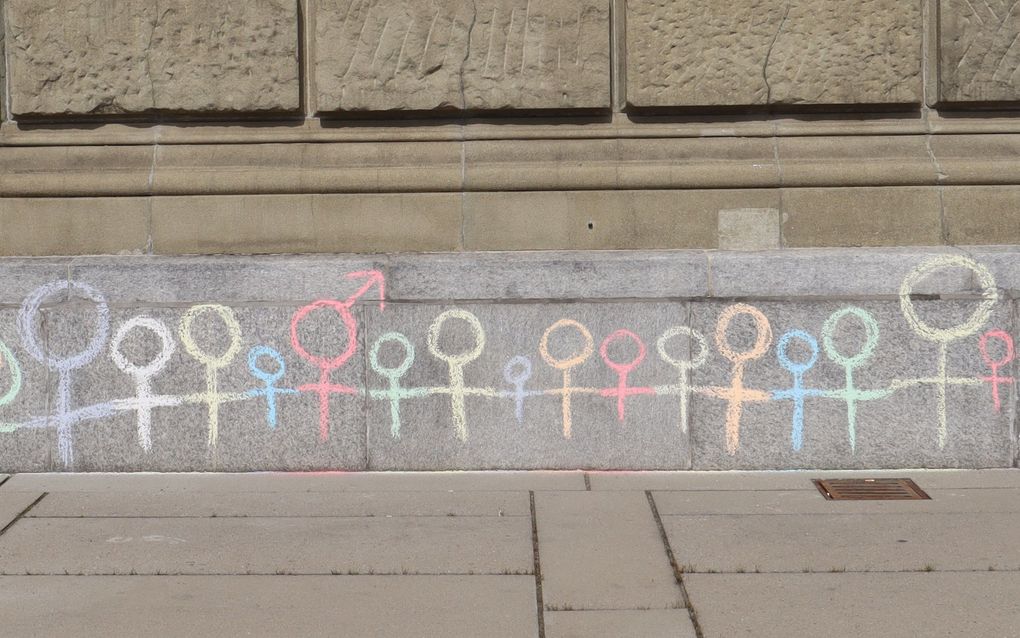Resistance against transgender laws mostly by women
02-04-2022
Opinion
Tineke van der Waal, RD

Photo Unsplash, Carol Jeng
Opinion
Several European countries have implemented laws to simplify legal gender change in the past years. Mostly, this happened without much debate. Women play the most critical role in the resistance.
If the Dutch House of Representatives passes the transgender law this spring – and it looks like it will – every Dutch citizen can change his or her legal gender by sending a letter to the municipality. An official statement from a psychologist or doctor is no longer necessary. In addition, children and teenagers? under the age of 16 can change their legal gender. Van Ginneken, a liberal member of parliament, proposed extending the law right away so that people can also register their gender as X. That option is for people who do not identify as male or female.
According to the initiators, former minister Dekker and Van Engelshoven, the transgender law fills "a clear need" and should do justice to the emancipation of transgender people. Groups that stand up for transgender rights say that the new legislation is crucial for transgenders for whom the current procedure is humiliating and time-consuming.
The new transgender laws are in line with the ideas of the Council of Europe and the United Nations about Sexual Orientation and Gender identity (SOGI). Self-determination is the starting point: one should determine for himself whether he is male or female. Thus, a statement from an expert is not necessary. Also, it is not needed to take hormones, undergo surgery or change your appearance to belong to the other gender. Not biology but feelings determine what is male and what is female. The UN Human Rights Council passed the first SOGI resolution in 2011. In the meantime, the Council of Europe set up a SOGI department in 2014 to "tackle the challenges in the field of human rights."
Denmark became the first European country that implemented legislation so that citizens could choose their gender. It did so in 2014. After that, Malta and Ireland followed in 2015, Norway and France in 2016, Belgium and Greece in 2017, Portugal in 2018, Luxemburg and Iceland in 2019 and Switzerland in 2020.
Also, non-European countries have accepted SOGI legislation. For instance, India, Brazil and other jurisdictions in Latin America did so. In the United States, Canada and other countries that consist of federations, legal recognition of gender differs per state. In 10 American states, citizens have been allowed to change their gender on their birth certificate since 2020; 21 more states have offered the possibility to do so on driver's licenses as well since last year.
Lack of debate
Most countries implemented new transgender laws without much debate. Only in 2021 discussions do come up in several countries. In a few cases, laws concerning Self ID are even rejected. Two factors explain why the debate is missing.
The first one consists of ignorance and incompetence. Most civilians have no idea what happens. But also, politicians do not always know what they are approving of. That is also the impression of the Italian journalist Marina Terragni. She is an outspoken opponent of the "Zan" law. "Zan" is the transgender law that the Italian Senate discussed last October. "Some representatives acknowledge that afterwards as well. They thought they voted for a law against discrimination against homosexuals and transgenders. They did not see that gender identity was the law's core."
British journalist James Kirkup confirms Terragni's perception of the members of the Senate. "Most politicians paid no attention to the details", he says about the moment that the reform of the Gender Recognition Act played up in London. "Instead, they outsourced their judgement to officials who were often very close, maybe even too close, to highly-effective professional advocacy groups, such as Stonewall." According to Kirkup, not only ignorance and incompetence play a role. In his opinion, politicians often look away from the issue. "Many politicians privately came to see the flaws and risks of the self-ID proposal. However, very few of them speak up about the issue publicly", the Brit says.
The second factor that diminishes the debate about transgender laws is that transgender lobby groups try to stay off the radar. During the past years, media shed light on transgender people and their lives. However, they do not focus on the consequences of gender registration or on the question of why the number of teen girls registering at a gender clinic grew so explosively in a short time. The golden rule for transgender lobbies is: the more attention to their agenda, the less successful they are.
That can be read in a European 'manual' for transgender lobby groups with the 'best practices' for campaign leaders who strive after different legislation concerning the recognition of gender. In countries where lobby groups did not share their exact plans with the broader public, trans rights progressed the fastest. That was shown by the report "Only adults?" which was published in 2019 by the group International Lesbian, Gay, Bisexual, Transgender, Queer and Intersex Youth & Student Organization (IGLYO) together with the internationally operating lawyer's office Dentons. In the meantime, this explains the ignorance and incompetence of the public and politicians.
Resistance, invariably by women
Resistance, invariably by women
Yet, some people speak out against the transgender law in some countries. The Economist even contained a headline that read: "The European continent starts gender war." At that moment, Germany and Spain just rejected laws concerning the registration of gender. After the summer, the British issue of Self ID disappeared, and the Italian Senate blocked the "Zan" law aimed at the self-determination of gender. By the way, gender registration is currently part again of the German coalition agreement, and Spain accepted a new, even more progressive proposal.
Gender registration changes the definition of male and female. Thus, it has consequences for everyone. But the resistance that arose against the law almost always comes mainly from women. Take Spain, where about 7000 women travelled to the Plaza de Neptuno in Madrid to demonstrate against the transgender law "Ley Trans". A collective of about fifty feminist groups organised the protest.
Or Italy, where radical feminists succeeded in breaking the media's silence and convinced right-wing parties, moderates and several leftist politicians with their arguments. "This means victory for us", journalist Terragni says. She speaks about a "tough battle."
This grassroots movement deserves a lot of attention and study. It shows how, even when politicians aren’t doing their job properly and listening to all sides, people with determination and organisation can make themselves heard.
And Great Britain. Due to women, gender registration disappeared from the political agenda. "It was a fight between big organisations and small groups of women. And the women won", the British journalist James Kirkup says looking back. "The movement shows how – even when politicians aren't doing their job properly and listening to all sides – people with determination and organisation can make themselves heard. They can also go head-to-head with the professional advocacy groups." Kirkup speaks of a grassroots movement that deserves a lot of attention and study, in his opinion.
Also, in Scotland, where the Government of Edinburgh created policies concerning this subject, women stand up. Last month, the message came out that Scottish women's groups combine powers in resistance against the transgender law.
In the Netherlands, the feminist movement Voorzij has been active for two years against the upcoming transgender law. But thus far, it barely finds entrance with politicians and the media. Instead, it experiences resistance, most likely because the foundation clings to the biological definition of female (and male) and explicitly declares that transwomen are no women.
Women are afraid of gender registration because they fear that it threatens their privacy and security. Women see their rights violated in changing rooms, toilets, shelters, prisons and in the sports world if people can choose themselves whether they are male or female.
Different countries
Between 2014 and 2021, several Western European countries have passed new transgender laws which determine that people can choose their own gender. This is called gender registration, self-identification or self-ID. The Netherlands and some other countries still have to decide about the issue.
Netherlands
The Dutch House of Representatives will soon vote on the new Transgender law; the debate is planned for May. In the new law, a statement from an expert is no longer required, and children under 16 will be able to change their legal gender. They do not need parental consent. The Dutch liberal party D66 has asked to include the option of X in the law as a gender, besides male and female.
Germany
The German Parliament voted in June 2021 against two laws of self-identification. One of them proposed to allow gender surgery for children from 14 years and older. They would not need the consent of their parents. The law also proposed that anyone who incorrectly addressed or referred to a transgender person could be fined with 2500 euros. The new Government, consisting of the SDP, FDP, and the Greens, though, included gender self-identification in the coalition agreement."
Great Britain (excluding Northern Ireland)
The Equality Act 2010 provides self-ID but offers the possibility to refuse transgenders in specific spaces. A proposal to actualise this law, "in agreement with the principles of the self-identification of gender", was withdrawn in 2020. The minister for Women and Equalities said in the autumn of 2021 that people could not change their legal gender just based on self-identification.
Scotland
The Scottish Government put forward a proposal for self-identification last March. Psychological and medical accountability would no longer be necessary, and the minimum age for legal gender change would be lowered to 16 years. According to a poll at the end of December 2021, 71 per cent of the Scots does not support self-identification. The British watchdog for equal treatment EHCR called the Scottish Government on January 26 to organise more consultation. It found that the law insufficiently considers the consequences for the rights of women based on sex. Women stand up; about twenty women's organisations form a coalition in resistance against the transgender law.
Spain
A proposal for self-identification whereby children could change their legal gender was also rejected in May 2021. A new proposal, now part of a political agreement between the Socialists and the Unidas Podemos, passed at the end of June. Children of 14 years and older can change their legal gender without parental consent.
Sweden
The Swedish Government announced a proposal for self-identification in November 2020. A poll showed in December 2021 that about 15 per cent of the Swedes is in favour of self-ID. The Karolinska University Hospital in Stockholm, which includes the largest Swedish gender clinic for teens, hit the brake in 2021. It no longer prescribes puberty blockers or hormonal therapy for minors.
Finland
The Finnish Prime Minister spoke out his support for self-identification in November 2021. A civilian initiative receives 50,000 signatures. Since 2021, stricter guidelines have been enforced concerning the treatment of transgenders. Therapy is preferred over hormones and surgery.
Related Articles






